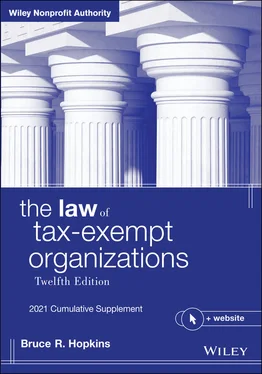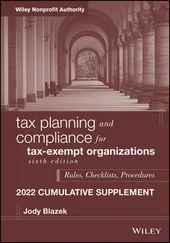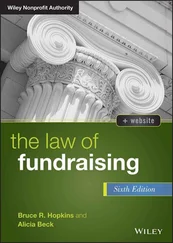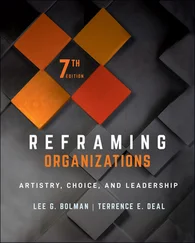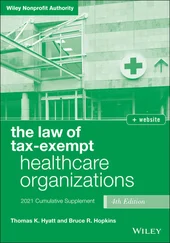Bruce R. Hopkins - The Law of Tax-Exempt Organizations, 2021 Cumulative Supplement
Здесь есть возможность читать онлайн «Bruce R. Hopkins - The Law of Tax-Exempt Organizations, 2021 Cumulative Supplement» — ознакомительный отрывок электронной книги совершенно бесплатно, а после прочтения отрывка купить полную версию. В некоторых случаях можно слушать аудио, скачать через торрент в формате fb2 и присутствует краткое содержание. Жанр: unrecognised, на английском языке. Описание произведения, (предисловие) а так же отзывы посетителей доступны на портале библиотеки ЛибКат.
- Название:The Law of Tax-Exempt Organizations, 2021 Cumulative Supplement
- Автор:
- Жанр:
- Год:неизвестен
- ISBN:нет данных
- Рейтинг книги:5 / 5. Голосов: 1
-
Избранное:Добавить в избранное
- Отзывы:
-
Ваша оценка:
- 100
- 1
- 2
- 3
- 4
- 5
The Law of Tax-Exempt Organizations, 2021 Cumulative Supplement: краткое содержание, описание и аннотация
Предлагаем к чтению аннотацию, описание, краткое содержание или предисловие (зависит от того, что написал сам автор книги «The Law of Tax-Exempt Organizations, 2021 Cumulative Supplement»). Если вы не нашли необходимую информацию о книге — напишите в комментариях, мы постараемся отыскать её.
The Law of Tax-Exempt Organizations, 2021 Cumulative Supplement — читать онлайн ознакомительный отрывок
Ниже представлен текст книги, разбитый по страницам. Система сохранения места последней прочитанной страницы, позволяет с удобством читать онлайн бесплатно книгу «The Law of Tax-Exempt Organizations, 2021 Cumulative Supplement», без необходимости каждый раз заново искать на чём Вы остановились. Поставьте закладку, и сможете в любой момент перейти на страницу, на которой закончили чтение.
Интервал:
Закладка:
Limit of Liability/Disclaimer of Warranty: While the publisher and author have used their best efforts in preparing this book, they make no representations or warranties with respect to the accuracy or completeness of the contents of this book and specifically disclaim any implied warranties of merchantability or fitness for a particular purpose. No warranty may be created or extended by sales representatives or written sales materials. The advice and strategies contained herein may not be suitable for your situation. You should consult with a professional where appropriate. Neither the publisher nor author shall be liable for any loss of profit or any other commercial damages, including but not limited to special, incidental, consequential, or other damages.
For general information on our other products and services or for technical support, please contact our Customer Care Department within the United States at (800) 762–2974, outside the United States at (317) 572–3993 or fax (317) 572–4002.
Wiley publishes in a variety of print and electronic formats and by print‐on‐demand. Some material included with standard print versions of this book may not be included in e‐books or in print‐on‐demand. If this book refers to media such as a CD or DVD that is not included in the version you purchased, you may download this material at http://booksupport.wiley.com. For more information about Wiley products, visit www.wiley.com.
Library of Congress Cataloging‐in‐Publication Data:
ISBN 978‐1‐119‐53804‐2 (main edition)
ISBN 978‐1‐119‐75628‐6 (paperback)
ISBN 978‐1‐119‐79872‐9 (ePDF)
ISBN 978‐1‐119‐75768‐9 (ePub)
Cover Design: Wiley
Cover Image: © Christina Krivonos / Shutterstock
About the Author
BRUCE R. HOPKINSis the principal in the Bruce R. Hopkins Law Firm, LLC, Kansas City, Missouri. He concentrates his practice on the representation of tax‐exempt organizations. His practice ranges over the entirety of law matters involving exempt organizations, with emphasis on the formation of nonprofit organizations, acquisition of recognition of tax‐exempt status for them, the private inurement and private benefit doctrines, governance, the intermediate sanctions rules, legislative and political campaign activities issues, public charity and private foundation rules, unrelated business planning, use of exempt and for‐profit subsidiaries, joint venture planning, tax shelter involvement, review of annual information returns, the law of charitable giving, and fundraising law issues.
Mr. Hopkins served as chair of the Committee on Exempt Organizations, Tax Section, American Bar Association; chair, Section of Taxation, National Association of College and University Attorneys; and president, Planned Giving Study Group of Greater Washington, DC.
Mr. Hopkins is the series editor of Wiley's Nonprofit Law, Finance, and Management Series. In addition to being the author of The Law of Tax‐Exempt Organizations, Twelfth Edition , he is the author of The Tax Law of Charitable Giving, Sixth Edition ; The Tax Law of Private Foundations, Fifth Edition ; The Planning Guide for the Law of Tax‐Exempt Organizations: Strategies and Commentaries ; Bruce R. Hopkins' Nonprofit Law Library (e‐book); Tax‐Exempt Organizations and Constitutional Law: Nonprofit Law as Shaped by the U.S. Supreme Court; Bruce R. Hopkins' Nonprofit Law Dictionary ; IRS Audits of Tax‐Exempt Organizations: Policies, Practices, and Procedures ; The Tax Law of Associations ; The Tax Law of Unrelated Business for Nonprofit Organizations ; The Nonprofits' Guide to Internet Communications Law ; The Law of Intermediate Sanctions: A Guide for Nonprofits ; Starting and Managing a Nonprofit Organization: A Legal Guide, Seventh Edition ; Nonprofit Law Made Easy ; Charitable Giving Law Made Easy ; Private Foundation Law Made Easy ; 650 Essential Nonprofit Law Questions Answered ; The First Legal Answer Book for Fund‐Raisers ; The Second Legal Answer Book for Fund‐Raisers ; The Legal Answer Book for Nonprofit Organizations ; and The Second Legal Answer Book for Nonprofit Organizations . He is the coauthor, with Thomas K. Hyatt, of The Law of Tax‐Exempt Healthcare Organizations, Fourth Edition ; with Alicia M. Beck, of The Law of Fundraising, Fifth Edition ; with David O. Middlebrook, of Nonprofit Law for Religious Organizations: Essential Questions & Answers ; with Douglas K. Anning, Virginia C. Gross, and Thomas J. Schenkelberg, of The New Form 990: Law, Policy, and Preparation ; also with Ms. Gross, of Nonprofit Governance: Law, Practices & Trends ; and with Ms. Gross and Mr. Schenkelberg, of Nonprofit Law for Colleges and Universities: Essential Questions and Answers for Officers, Directors, and Advisors . He also writes Bruce R. Hopkins' Nonprofit Counsel , a monthly newsletter, published by John Wiley & Sons.
Mr. Hopkins maintains a website providing information about the law of tax‐exempt organizations, at www.brucerhopkinsbooks.com. Material posted on this site includes a current developments outline concerning this aspect of the law, discussions of his books, and various indexes that accompany his newsletter.
Mr. Hopkins received the 2007 Outstanding Nonprofit Lawyer Award (Vanguard Lifetime Achievement Award) from the American Bar Association, Section of Business Law, Committee on Nonprofit Corporations. He is listed in The Best Lawyers in America , Nonprofit Organizations/Charities Law, 2007–2021.
Mr. Hopkins is the Professor from Practice at the University of Kansas School of Law, where he teaches courses on the law of tax‐exempt organizations.
Mr. Hopkins earned his JD and LLM degrees at the George Washington University, his SJD at the University of Kansas, and his BA at the University of Michigan. He is a member of the bars of the District of Columbia and the state of Missouri.
Preface
This 2021 cumulative supplement is the second supplement to accompany the twelfth edition of this book. The supplement covers developments in the law of tax‐exempt organizations as of the close of 2020.
Enactment of what is informally known as the Tax Cuts and Jobs Act (TCJA) continues to reverberate through exempt organizations law and dominates the current developments scene. The Department of the Treasury and the IRS are issuing guidance (notices and final regulations) in the aftermath of the TCJA, such as in the context of the bucketing rule for computation of unrelated business taxable income, taxation of certain private colleges' and universities' endowment income, and taxation of the excess compensation of certain exempt organizations' executives. Fortunately, the law causing inclusion as unrelated business income items of the value of certain types of fringe benefits was repealed.
The Treasury/IRS 2020–2021 Priority Guidance Plan, dated November 17, 2020, inventories the federal government's efforts to generate guidance in TCJA and other contexts. (As of the date of publication, the proposed regulations to accompany the donor‐advised funds statutory law have yet to emerge.) This guidance is summarized in this cumulative supplement.
Another item of legislation, the Taxpayer First Act, brought more statutory law to the exempt organizations setting (although not nearly as dramatic as the TCJA). This statute instituted mandatory electronic filing of tax‐exempt organizations' returns, provided some relief for organizations that may otherwise have their exemptions revoked for nonfiling of returns, and established a statutory Independent Office of Appeals in the IRS. These new laws are also summarized in this cumulative supplement.
Читать дальшеИнтервал:
Закладка:
Похожие книги на «The Law of Tax-Exempt Organizations, 2021 Cumulative Supplement»
Представляем Вашему вниманию похожие книги на «The Law of Tax-Exempt Organizations, 2021 Cumulative Supplement» списком для выбора. Мы отобрали схожую по названию и смыслу литературу в надежде предоставить читателям больше вариантов отыскать новые, интересные, ещё непрочитанные произведения.
Обсуждение, отзывы о книге «The Law of Tax-Exempt Organizations, 2021 Cumulative Supplement» и просто собственные мнения читателей. Оставьте ваши комментарии, напишите, что Вы думаете о произведении, его смысле или главных героях. Укажите что конкретно понравилось, а что нет, и почему Вы так считаете.
